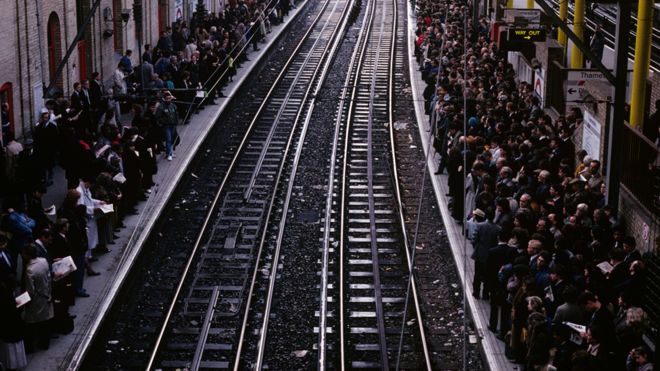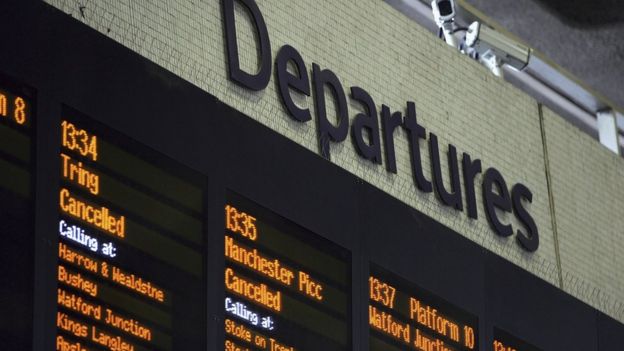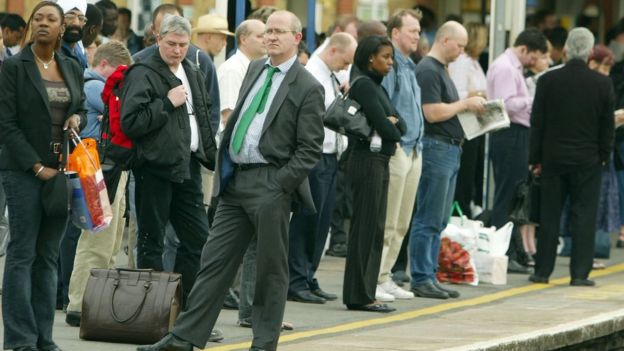By Justin ParkinsonBBC News Magazine
 Image copyrightAlamy
Image copyrightAlamy
Crew shortages cause almost one in 10 delays and cancellations on Britain's railways, the BBC has learned.
They accounted for 9.42% of 1.93 million delays and cancellations from 1 April 2013 to 12 December 2015, figures from the Office of Rail and Road show.
Govia Thameslink Railway - which operates Southern, Thameslink and Gatwick Express services - had the highest rate, at 13.59%.
London Midland and First Transpennine Express were the next worst on 13.53%.
Virgin East Coast had the lowest rate, at 2.63%, while Virgin West Coast's was 3.69%. Image copyrightGetty Images
Image copyrightGetty Images
 Image copyrightGetty Images
Image copyrightGetty Images
Crew shortages are caused by sickness, leave, mistakes drawing up rosters and problems transporting drivers and other staff to trains in time for departure.
This, according to the ORR figures obtained by the BBC News Magazine, is usually judged to be the the fault of the operator itself, but sometimes the problems experienced on another network prevent staff from getting to work on time.
Rail delays caused by crew shortages
Govia Thameslink Railway 13.59%
First Transpennine Express 13.53%
London Midland 13.53%
Caledonian Sleeper 10.50%
CrossCountry 10.40%
Northern Rail 9.83%
Merseyrail Electrics 2002 Ltd 9.47%
Arriva Trains Wales 8.33%
The Chiltern Railway Company Ltd 8.27%
Stagecoach South Western Trains Ltd 7.55%
Southeastern 7.45%
Scotrail 7.43%
East Midlands Trains 7.42%
London Overground 6.78%
Great Western 6.59%
TfL Rail 5.56%
c2c 5.39%
Greater Anglia 5.30%
Heathrow Express 4.65%
Grand Central 4.33%
First Hull 4.26%
Virgin West Coast 3.69%
Virgin East Coast 2.63%
OVERALL 9.42%
So why don't operators allow enough extra staffing capacity to cope with crises?
It takes more than a year to train a driver, including a minimum of 240 hours of practical training and 840 hours of learning theory. After this they have to accumulate specific "route knowledge" by shadowing an experienced driver, potentially leading to more staff shortages, at least in the short term, says transport writer Christian Wolmar.
Staff often use a car to get to work, meaning they can get stuck in traffic or bad weather too.
"It's not like the old days, when you maybe had a depot and had the drivers living next door in cottages," says Wolmar.
"There was a boy whose job it was to wake the driver up, as they didn't have alarm clocks in those days. The staff always lived nearby and that's not the case now."
Just before Christmas Govia Thameslink Railway offered an explanation for crew shortages. Disruptions elsewhere led to staff being "displaced", it said.
"However, one of the underlying factors is that sometimes we do not have enough train crew to carry out both day-to-day operations," the company added, "and the large amount of training required to enable long-term passenger service improvements, without asking train crew to work rest days."
Rail fares went up by an average of 1.1% in England, Scotland and Wales at the start of the year, while many thousands of commuters are spending several thousand pounds a year for a season ticket. Image copyrightGetty Images
Image copyrightGetty Images
 Image copyrightGetty Images
Image copyrightGetty Images
Keith Richmond, of the train drivers' union Aslef, argues services are unlikely to improve soon. "The truth is that none of the 23 train operators have enough drivers," he says. "It takes a year to train a train driver and it's quite expensive. They don't want to train drivers. What they do is pay a driver a little bit more and get a driver from another company or they simply offer overtime.
"None of the companies have enough drivers to deliver on their franchise promises," Richmond adds. "There's no fat on the bones. In other sectors, like manufacturing and retail, they recognise that. The train operators are badly run and they don't deliver on their promises, only their obligations to the shareholders, rather than the customers."
Figures from Network Rail show train punctuality has improved since 2002, but that it has fallen slightly in recent years, with more than one in 10 services being late. Lateness is defined as arriving at the terminus station more than five minutes behind schedule for commuter services and 10 minutes for long-distance routes. Image copyrightPA
Image copyrightPA
 Image copyrightPA
Image copyrightPA
Govia Thameslink Railway says the figure showing delays and cancellations caused by staff shortages "represents less than 2%" of total services, adding that "cancellations caused by train crew not being available is not the issue now that it was before Christmas - for which we apologise to our passengers". "To address this," adds a spokesman, "we have the UK's biggest-ever driver recruitment and training programme to address the occasions when we do not have enough train drivers."
London Midland says it's cut overall levels of cancellations "significantly", from 6% in November 2013 to 2% last month. A spokesman adds that crew availability is "one of many factors" it has dealt with.
And First Transpennine says it has "focused on increasing the resilience of the company by recruiting more drivers across the network".
"We are investing record amounts in our railways to make journeys better for passengers," says a Department for Transport spokesman, "and we monitor the delivery of services and underlying issues such as train crew shortages closely."



.jpg)
.jpg)



0 comments:
Post a Comment